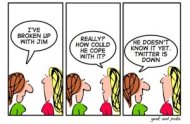Social media is making it easier than ever to contribute to the evolution of language. You no longer have to be published through traditional avenues to bring word trends to the attention of the masses. From ‘unfriend’ to ‘selfie,’ social media is clearly having an impact on language. A case in point is Oxford Dictionaries 2013 Word of the Year, selfie: the earliest use of the word has been traced to an Australian Internet Forum.

Figure 1 Social Media’s Simple Language
What social media has done is enable us to communicate with a much larger number of people on a global scale in a way that we only really used to be able to do on a local level. The result? An ever-increasing speed of communication. Facebook lets you communicate quickly, effectively and, most importantly, efficiently because written exchanges are concise and shared between all the friends you are connected with. On Twitter, there’s a brief 140-character limit but with a catch, so you are quite literally forced to make the statement short.
From the introduction of new words to new meanings for old words to changes in the way we communicate, the combination of informal, personal communication and the mass audience afforded by social media is a recipe for rapid change. ‘Friended’ and ‘unfriended’ (the process of adding or removing someone from your circle of friends) are two examples of words that have been given a new meaning due to their usage on Facebook. The word ‘friend’ and ‘befriend’ is from Old English originating in the 13th Century.

Figure 2 Popular Acronyms
The use of acronyms are now commonplace substitutes to whole sentences; LOL (laugh out loud), OMG (Oh my God), TTYL (talk to you later) and emoticons (a representation of a facial expression such as a smile or frown), are a lazy form of writing used to convey what the user is feeling (Stylecaster. (n.d.) para.3).
The language of social media is having an effect on the way we use English in day-to-day life. It’s having an impact on our written and oral communications.
A whole host of words originating from social media and the wider Internet have become so commonplace that they’ve now slipped into popular usage. The Internet is reshaping our long-lost hardcover dictionary, for better or for worse, we are all in a new world of communications and most of us will have to learn the new language.

Figure 3 The New Language
What is your view on the evolution of language through social media?
Have social media’s new host of words slipped into popular usage?
Facebook Promotional Post:
Social Media’s Art of words
The evolution of language through social media
Is social media reshaping our dictionary?
Twitter Promotional Post:
#SocialMediaImpactLanguage
#ArtofWords
#SimpleLanguage
Napier Lopez. September, 2016. Twitter finally relaxes 140-character limit, but with a catch. Retrieved from http://bit.ly/2lW3ruY
Oxford dictionaries. (2013). The Oxford Dictionaries Word of the Year 2013 is Selfie. Retrieved from http://bit.ly/194mWE7
Stack Exchange. (n.d). English Language and Usage. Retrieved from http://bit.ly/2lQRDam
Stylecaster. (n.d.). 101 Social Media Acronyms and Abbreviations (And what they mean!). Retrieved from http://bit.ly/1M4EP7A
Ted Camp. October 25, 2016. Have You Been “Friended” or “Unfriended”? Retrieved from http://bit.ly/2lYMs7Y









